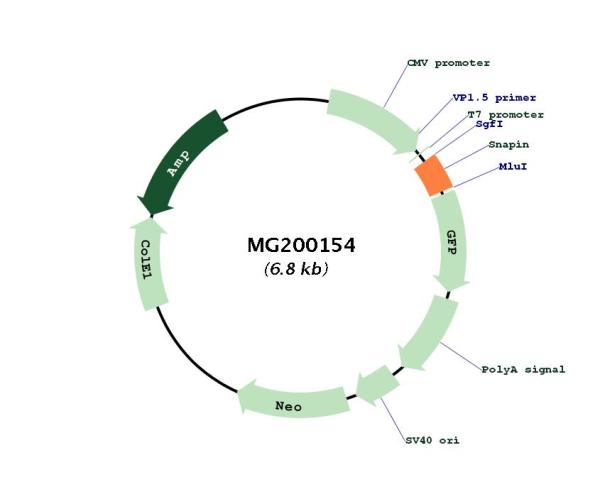Snapap (BC006744) Mouse Tagged ORF Clone
CAT#: MG200154
- TrueORF®
Snapap (tGFP-tagged) - Mouse SNAP-associated protein (cDNA clone MGC:12076 IMAGE:3708620)
ORF Plasmid: DDK
Lentiviral Particles: DDK w/ Puro mGFP w/ Puro
AAV Particle: DDK
"BC006744" in other vectors (4)
Specifications
| Product Data | |
| Type | Mouse Tagged ORF Clone |
| Tag | TurboGFP |
| Symbol | Snapap |
| Synonyms | 25kDa; AA407989; AV026596; Bloc1s7; Snap25bp; Snapap |
| Vector | pCMV6-AC-GFP |
| E. coli Selection | Ampicillin (100 ug/mL) |
| Mammalian Cell Selection | Neomycin |
| Sequence Data |
>MG200154 representing BC006744
Red=Cloning site Blue=ORF Green=Tags(s) TTTTGTAATACGACTCACTATAGGGCGGCCGGGAATTCGTCGACTGGATCCGGTACCGAGGAGATCTGCC GCCGCGATCGCC ATGTTGGTTGCCCATTTCCTCTTCCCAGAACTGTGCCGGATCAATGAGGATCAGAAAGTGGCCCTGGATC TGGACCCCTATGTTAAGAAGCTGCTTAATGCCAGGCGACGAGTTGTCTTGGTCAACAATATTTTACAGAA TGCACAGGAACGACTAAGGCGGTTAAACCACAGCGTGGCCAAGGAAACAGCTCGCAGGAGAGCTATGCTG GATTCAGGAGTTTACCCTCCTGGTTCTCCAAGCAAA ACGCGTACGCGGCCGCTCGAG - GFP Tag - GTTTAA >MG200154 representing BC006744
Red=Cloning site Green=Tags(s) MLVAHFLFPELCRINEDQKVALDLDPYVKKLLNARRRVVLVNNILQNAQERLRRLNHSVAKETARRRAML DSGVYPPGSPSK TRTRPLE - GFP Tag - V |
| Restriction Sites |
SgfI-MluI
Cloning Scheme for this gene
Plasmid Map

|
| ACCN | BC006744 |
| ORF Size | 248 bp |
| OTI Disclaimer | The molecular sequence of this clone aligns with the gene accession number as a point of reference only. However, individual transcript sequences of the same gene can differ through naturally occurring variations (e.g. polymorphisms), each with its own valid existence. This clone is substantially in agreement with the reference, but a complete review of all prevailing variants is recommended prior to use. More info |
| OTI Annotation | This clone was engineered to express the complete ORF with an expression tag. Expression varies depending on the nature of the gene. |
| Product Components | The ORF clone is ion-exchange column purified and shipped in a 2D barcoded Matrix tube containing 10ug of transfection-ready, dried plasmid DNA (reconstitute with 100 ul of water). |
| Reconstitution | 1. Centrifuge at 5,000xg for 5min. 2. Carefully open the tube and add 100ul of sterile water to dissolve the DNA. 3. Close the tube and incubate for 10 minutes at room temperature. 4. Briefly vortex the tube and then do a quick spin (less than 5000xg) to concentrate the liquid at the bottom. 5. Store the suspended plasmid at -20°C. The DNA is stable for at least one year from date of shipping when stored at -20°C. |
| Reference Data | |
| RefSeq | BC006744, AAH06744 |
| RefSeq Size | 1858 bp |
| RefSeq ORF | 248 bp |
| Locus ID | 20615 |
| Cytogenetics | 3 F1 |
| Gene Summary | Component of the BLOC-1 complex, a complex that is required for normal biogenesis of lysosome-related organelles (LRO), such as platelet dense granules and melanosomes. In concert with the AP-3 complex, the BLOC-1 complex is required to target membrane protein cargos into vesicles assembled at cell bodies for delivery into neurites and nerve terminals. The BLOC-1 complex, in association with SNARE proteins, is also proposed to be involved in neurite extension. Plays a role in intracellular vesicle trafficking and synaptic vesicle recycling. May modulate a step between vesicle priming, fusion and calcium-dependent neurotransmitter release through its ability to potentiate the interaction of synaptotagmin with the SNAREs and the plasma-membrane-associated protein SNAP25. Its phosphorylation state influences exocytotic protein interactions and may regulate synaptic vesicle exocytosis. May also have a role in the mechanisms of SNARE-mediated membrane fusion in non-neuronal cells (PubMed:16760431, PubMed:19546860, PubMed:21998198). As part of the BORC complex may play a role in lysosomes movement and localization at the cell periphery. Associated with the cytosolic face of lysosomes, the BORC complex may recruit ARL8B and couple lysosomes to microtubule plus-end-directed kinesin motor (By similarity).[UniProtKB/Swiss-Prot Function] |
Documents
| Product Manuals |
| FAQs |
| SDS |
Resources
Other Versions
| SKU | Description | Size | Price |
|---|---|---|---|
| MC200745 | Snapap (untagged) - Mouse SNAP-associated protein (cDNA clone MGC:12076 IMAGE:3708620), (10ug) |
USD 150.00 |
|
| MR200154 | Snapap (Myc-DDK-tagged) - Mouse SNAP-associated protein (cDNA clone MGC:12076 IMAGE:3708620) |
USD 150.00 |
|
| MR200154L3 | Lenti ORF clone of Snapap (Myc-DDK-tagged) - Mouse SNAP-associated protein (cDNA clone MGC:12076 IMAGE:3708620) |
USD 450.00 |
|
| MR200154L4 | Lenti ORF clone of Snapap (mGFP-tagged) - Mouse SNAP-associated protein (cDNA clone MGC:12076 IMAGE:3708620) |
USD 450.00 |
{0} Product Review(s)
Be the first one to submit a review






























































































































































































































































 Germany
Germany
 Japan
Japan
 United Kingdom
United Kingdom
 China
China

